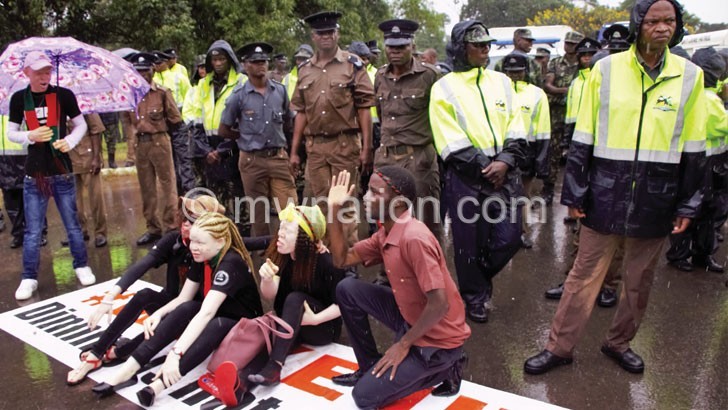‘Police, intelligence have failed’
A joint committee of Parliament probing the attacks and killings of people with albinism (PWAs) has faulted the Malawi Police Service for lacking specialised skills to investigate the cases while criticising the National Intelligence Service for not doing its part.

The joint committee—comprising Social and Community Affairs, Legal Affairs, and Defence and Security—presented a report to Parliament yesterday following a week-long inquiry to understand the levels of coordination of law enforcement agencies, get to the root cause of delays in concluding criminal investigations and unearth revelations of the location of the “market” where body parts of victims are taken.
In its report to the House, the joint committee chairperson Richard Chimwendo Banda said the government should consider requesting for special assistance from foreign security agencies on the matter.
“Such agencies can provide direction in terms of sophisticated investigative and interrogation techniques,” he said.
According to the report, Police Inspector General Rodney Jose told the committee that they have employed intensive techniques to trace and make prompt arrests following a crime.
He said they have even used new methods of investigation such as DNA testing.
But the joint committee observed that all efforts so far have clearly fallen short of stopping the attacks and these will continue unless the issue of the market is put to rest.
In his report to the House, Chimwendo Banda said the committee’s inquiry has failed to come up with conclusive evidence on the existence of and location of a specific market for bones of persons with albinism.
“To complicate this matter, some apprehended suspects have claimed to be taking the body parts to a market in Mozambique and Tanzania. However, reports from those countries point to suspects stating that the said market operates in Malawi,” said Chimwendo Banda.
The death of three suspects in police custody have not helped matters and the joint committee believe this was a lost opportunity for the country to identify the source of the market and nip it in its bud.
One suspect died in Karonga after allegedly hanging himself, another suspect in Machinga allegedly jumped from a moving Police vehicle. while preliminary results of a post-mortem on the suspect in the Dedza abduction of a 14-year-old boy show he died after he was tortured and hit in the head with a hard object.
Director of Public Prosecutions (DPP) Mary Kachale told the joint committee that her office had completed 45 cases, closed 13 undetected cases, 44 cases are under investigation and 28 cases are in court.
The committee, however, bemoaned that the few prosecutors in the DPP’s office are overwhelmed because of other cases they have to deal with.
In their reactions to the report, some members of Parliament faulted government for not responding to reports of attacks on PWAs with speed.
Mzimba North MP Agnes Nyalonje said since the attacks started in 2014, government developed the National Action Plan which had started to gather dust until more deaths were reported.
On her part, Mangochi South MP Lilian Patel also faulted the government for delaying to implement the action plan.
Meanwhile, Malawi Human Rights Commission executive secretary David Nungu and Association of Persons with Albinism in Malawi (Apam) have asked for more time to scrutinise the report before responding to the proposed recommendations.
Ministry of Gender, Children, Disability and Social Welfare estimates that the country has a population of about 15 000 PWAs.





